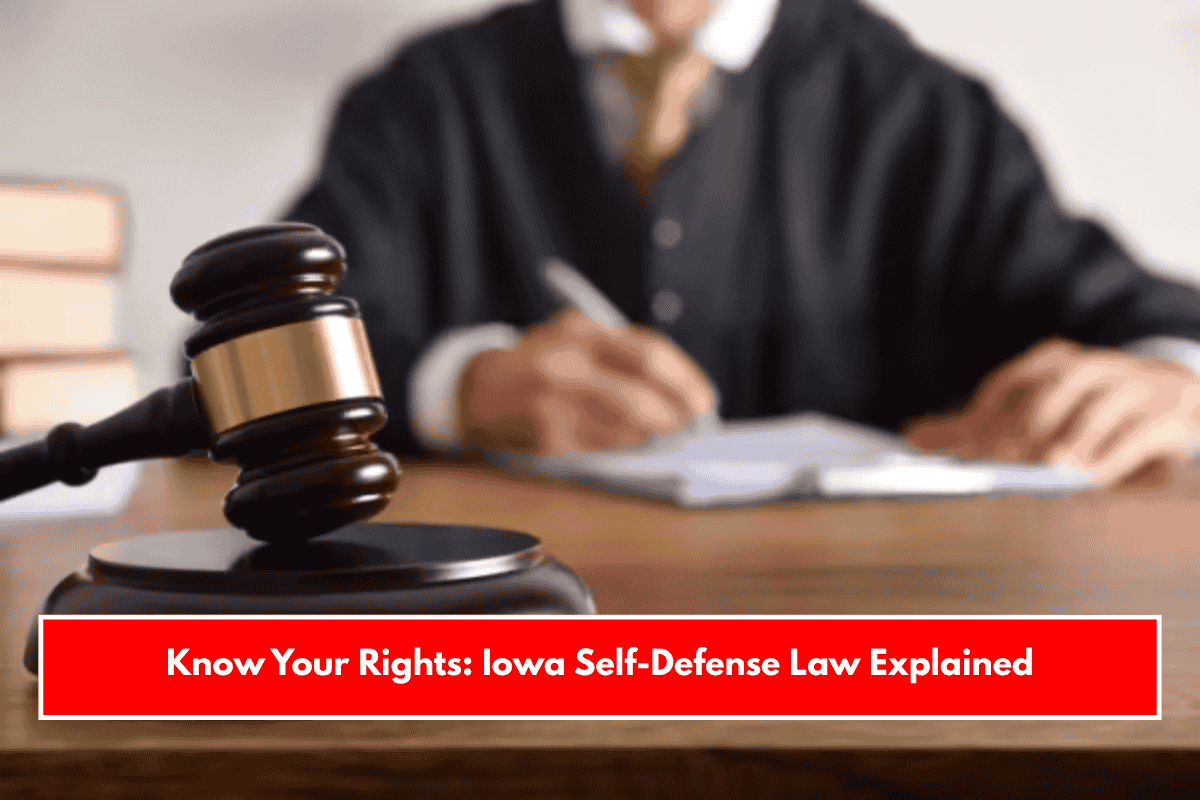Understanding your rights under Iowa’s self-defense laws is crucial for ensuring your safety and protecting yourself from legal consequences in high-stress situations. Iowa law provides clear guidelines on when and how you can use force—including deadly force—to defend yourself, others, or your property. Here’s a comprehensive breakdown of how self-defense works in Iowa.
Reasonable Force and Self-Defense
Iowa law, primarily governed by Chapter 704 of the Iowa Code, allows individuals to use “reasonable force” to defend themselves or others from the imminent use of unlawful force. Reasonable force is defined as the amount of force a reasonable person would deem necessary under the circumstances to prevent harm. This can include defending yourself, another person, or your property from criminal interference.
Deadly Force: When Is It Justified?
Deadly force is defined as force intended to cause serious injury or that a person knows is likely to result in serious injury or death. The law permits the use of deadly force only when you reasonably believe it is necessary to prevent imminent death or serious injury to yourself or another person. For example, if someone unlawfully and forcibly enters your home, place of business, or occupied vehicle, you are presumed to have a reasonable belief that using deadly force is necessary to protect yourself or others.
However, deadly force is not justified solely for the protection of property. It is reserved for situations where there is an immediate threat to life or serious bodily harm.
The Castle Doctrine and Stand Your Ground
Iowa law incorporates both the “castle doctrine” and “stand your ground” principles:
- Castle Doctrine: This doctrine allows you to use force, including deadly force, without a duty to retreat if you are in your own home, business, or occupied vehicle and someone is unlawfully entering or has entered by force or stealth. This legal protection does not extend to public places.
- Stand Your Ground: Since 2017, Iowa has adopted a “stand your ground” law. This means that if you are in a place where you have a legal right to be, you are not required to retreat before using reasonable force to defend yourself or others. The law provides immunity from civil liability for those who act in self-defense, though each case is still subject to legal scrutiny.
Limitations and Exceptions
There are important limitations to Iowa’s self-defense protections:
- If you are engaged in criminal activity at the time force is used, you cannot claim self-defense.
- If you provoke the use of force against yourself, self-defense may not apply.
- Once the threat has ended, your right to use force ceases.
- The presumption of justification does not apply if the person against whom force is used has a lawful right to be in the location or lawful custody of the person being removed.
Defense of Property
You may use reasonable force to prevent or terminate criminal interference with your property or to aid another in the lawful defense of their property. However, deadly force is not justified solely to protect property—it is only justified if you reasonably believe it is necessary to prevent imminent death or serious injury.
Legal Weapons for Self-Defense
Iowa law permits the use of various self-defense weapons, including firearms, stun guns, and tasers, with certain regulations:
- Firearms: Iowa practices “constitutional carry,” allowing individuals to carry firearms without a permit, though obtaining a permit is recommended for concealed carry. The use of a firearm in self-defense must meet the standard of reasonable belief in imminent danger.
- Stun Guns and Tasers: Legal for self-defense, but concealed carry requires a permit. Open carry is allowed on private property.
Practical Considerations
While Iowa law provides robust protections for self-defense, each situation is fact-specific. If you are involved in a self-defense incident:
- Contact law enforcement immediately.
- Document all details of the incident.
- Consult with a knowledgeable attorney to ensure your rights are protected.
Key Points of Iowa Self-Defense Law
| Principle | Description |
|---|---|
| Reasonable Force | Allowed to prevent imminent harm to self, others, or property |
| Deadly Force | Justified only to prevent imminent death or serious injury |
| Castle Doctrine | No duty to retreat in your home, business, or vehicle |
| Stand Your Ground | No duty to retreat in any place you have a legal right to be |
| Limitations | Not available if engaged in crime, provoking force, or after threat has ended |
| Defense of Property | Reasonable force allowed; deadly force not justified solely for property protection |
| Self-Defense Weapons | Firearms, stun guns, tasers legal with specific regulations |
Understanding Iowa’s self-defense laws empowers you to act decisively and within the law during critical moments. Always stay informed and seek legal advice if you have questions about your rights or responsibilities in a self-defense situation.
Sources:
- https://www.legis.iowa.gov/docs/code/704.pdf
- https://crateclub.com/blogs/loadout/what-self-defense-weapons-are-legal-in-iowa-a-comprehensive-guide
- https://crateclub.com/blogs/loadout/does-iowa-have-a-self-defense-law-understanding-the-legal-landscape
- https://www.branstadlaw.com/blog/2022/january/is-iowa-a-stand-your-ground-state-/















